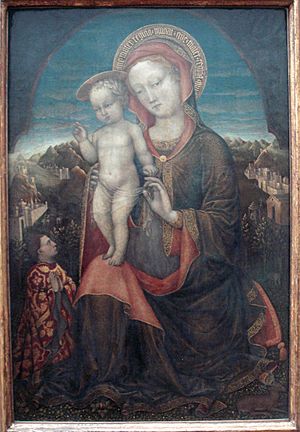Jacopo Bellini facts for kids

Jacopo Bellini (born around 1400 – died around 1470) was a very important Italian painter. He helped create the new Renaissance style of art in Venice and northern Italy. His sons, Gentile and Giovanni Bellini, and his son-in-law, Andrea Mantegna, also became famous painters.
Not many of Jacopo Bellini's paintings still exist today. However, his old sketchbooks are very special. One is in the British Museum and another is in the Louvre. These books show his interest in drawing landscapes and detailed buildings. They are his most important gift to art history. His remaining artworks show how he used "linear perspective." This is a way to make flat paintings look like they have real depth. He also used the rich colors and decorative patterns that were popular in Venetian painting.
Contents
Jacopo Bellini's Life and Art
Early Years and Learning
Jacopo Bellini was born in Venice, a famous city in Italy. He probably learned how to paint from another artist named Gentile da Fabriano. Gentile da Fabriano was working in Venice at that time.
In 1411 and 1412, Jacopo was in Foligno. There, he worked with Gentile da Fabriano on paintings inside the Palazzo Trinci. By 1423, Bellini was in Florence. In Florence, he saw new artworks by famous artists like Brunelleschi, Donatello, Masolino da Panicale, and Masaccio. These artists were creating exciting new styles.
Opening His Workshop
In 1424, Jacopo Bellini opened his own art workshop in Venice. He ran this workshop until he died. It was a place where he taught his sons and other young artists.
Many of his greatest paintings are now lost. One example is a huge painting called Crucifixion. It was in the Cathedral of Verona and was painted in 1436.
Around 1430, he painted a picture called Madonna and Child. This painting is now in the Accademia Carrara. For a while, people thought Gentile da Fabriano had painted it.
Working for Important People
In 1441, Jacopo Bellini was in Ferrara. He worked for a leader named Leonello d'Este. Another famous artist, Leon Battista Alberti, was also there. Bellini painted a portrait of Leonello d'Este, but this painting is now lost.
From this time, a painting called Madonna dell'Umiltà still exists. It was probably ordered by one of Leonello's brothers.
New Ideas in His Art
The influence of Masolino da Panicale helped Bellini use more modern ideas. These were early Renaissance themes. You can see this in his painting Madonna with Child from 1448. This painting is in the Pinacoteca di Brera. In this work, you can see "perspective" for the first time. Perspective makes objects in a painting look like they are at different distances. The people in the painting also look more solid and important.
Later, he created paintings for Venetian churches. These included San Giovanni Evangelista (in 1452) and St. Mark's (in 1466). Sadly, these works are now lost. A painting from 1459, Madonna with Blessing Child, is in the Gallerie dell'Accademia.
Later Life and Teaching
Later, Jacopo Bellini visited Padua. There, he taught a young artist named Andrea Mantegna. He taught Mantegna about perspective and classical art ideas. In 1460, Bellini finished a portrait of Erasmo Gattamelata in Padua, but this painting is also lost.
From his later years, a damaged painting called Crucifix is in the Museum of Verona. An Annunciation painting is in the church of Sant'Alessandro in Brescia.
An engineer named Giovanni Fontana showed Bellini a book about perspective. This likely helped Bellini with his art.
Selected Works
-
Madonna and Child Blessing (around 1455). This painting also uses tempera on wood. It is 94 cm tall and 66 cm wide. It is displayed at the Gallerie dell'Accademia in Venice.
-
Madonna With Child (around 1465). This painting uses oil paint on a wooden panel. It is 69.2 cm tall and 46.9 cm wide. You can find it at the Los Angeles County Museum of Art.
See also
 In Spanish: Jacopo Bellini para niños
In Spanish: Jacopo Bellini para niños
 | James B. Knighten |
 | Azellia White |
 | Willa Brown |




